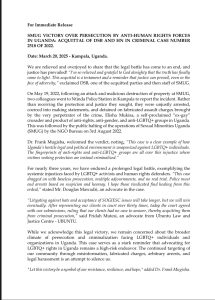Sanyu Hajarah Batte, is the newly elected alternate representative for the key populations on the Uganda Country Coordinating Mechanism for the Global Fund. She is also the founder and Executive Director of Lady Mermaids Bureau, a sex workers led organisation.
“I have been working for a community based led organisation and we've done a lot of community health and policy advocacy towards bettering the lives of sex workers. We work in an environment which stigmatizes and discriminates against key populations especially sex workers and LGBTIO persons. The society we work in is also not very friendly but this work is
Kuchu Times’ caught up with Hajarah and chatted about the issues affecting key populations and what she hopes to bring to the table during her term of office on the UCCM committee.
When one talks about key populations, statistical evidence is one of the ways to help policy and decision makers plan effectively for these marginalised groups. Can you take us through the latest statistics of HIV prevalence within key populations?
The world has committed to ending the HIV epidemic by 2020 and Uganda is also working towards this goal. As key populations, we have to contribute to the UNAIDS 90/90/90 strategy; however the HIV prevalence is very high within key pops.
According to the Ugandan AIDS Indicator Survey 2011, the general population is at 7.3%, female sex workers are at 33-36%, men who have sex with men (MSM) are at 13.2%, Fisher Folks are at 22- 25%, Truckers are at 25-32%, uniformed personnel are at 10-18% while people who inject drugs are at 15%.
According to these statistics, you can see that the HIV prevalence is still very alarming within the key populations;this is because we don’t have meaningful engagements yet we have laws and policies that are targeting the key populations especially the LGBTI persons and sex workers.
What would you say are the most pressing issues affecting key populations in Uganda?
I talked about meaningful engagement, I think KPs are a vulnerable community which has been left behind by many key players including our own government because they contrinue to table and enforce policies that criminalise just our mere existence. If someone’s existence is made a crime, it makes planning for them even more complicated.
Policy makers and influencers discuss the 90/90/90 strategy on a daily basis but if they are not willing to bring key populations on board, then we are simply being retrogressive. When it comes to HIV prevalence, KPs have the highest percentage in the country. We must now fight to make sure our needs are not sidelined- they must be incorporated into the greater health and national policies.
Briefly share with us what your plans as a KP representative on the UCCM Committee are
UCCM is a strategic platform and I k now that together with Moses, this is a platform where we have to raise and articulate our issues at the national level; I intend to tell people what KPs want. They can not continue to plan for us without asking us what we need. My biggest task therefore is to make sure the policy makers know the needs of key populations.
We had KPs representatives on the outgoing committee and I am aware they did a lot of great work so we won’t take their work for granted, we shall begin from where they ended. We have to do consultations with them and different stake holders working closely with the KPs to make sure we also carry their efforts forward.
You are a vocal activist for sex workers rights. Do you think you have the capacity to articulate the issues affecting other KPs?
I was elected and selected by all the constituencies that make up key populations. Because I am a sex worker, my clients have been long distance truck drivers and fisher folks; I am therefore well versed with issues that affect most of these groups. I am also a bisexual woman meaning that I understand what it means to be a sexual minority .
I do not doubt my ability to represent and push for better policies for all KPs regardless of which constituency they might fall under.




